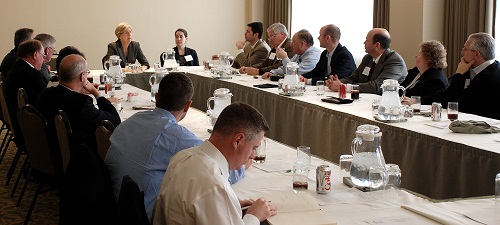As you have been reading here on the blog, we released the first draft versions of a combined Good Faith Estimate and Truth in Lending disclosure form in May. Here on the website, we asked for public feedback through the Know Before You Owe project. We’ve also been talking to some of the institutions that will have to use these forms with their customers.
Shortly after Know Before You Owe launched, I was a guest at the New Hampshire and Vermont Bankers Associations’ annual compliance conference. I was struck by participants’ enthusiastic response to the project. Many attendees mentioned that they were impressed not only by the lower burden imposed by the draft forms, but also by the CFPB’s eagerness to solicit feedback at an early stage of the process.
We also spoke with community bankers from Connecticut, Rhode Island, and Massachusetts when they stopped by the CFPB office. Steve Antonakes, the CFPB’s Assistant Director for Large Bank Supervision, and I answered a variety of questions and gathered input from individual bankers about each of their views. One banker suggested that we conduct outreach to the software providers who help create mortgage disclosure forms. This will help bring the technological concerns around building these forms into the process.
Later that afternoon, we discussed the Know Before You Owe forms with individuals from 20 credit unions who each shared their own opinions. This ad hoc meeting lead to valuable, specific insights on what mortgage information works best for consumers.
We are committed to remaining attentive to the concerns of credit unions and community banks throughout the development of CFPB priorities, and we look forward to continuing this dialogue for future CFPB initiatives.
A mortgage loan market that works for all Americans benefits from input from many places. We wanted to make sure individuals from credit unions and community banks were heard from alongside the consumers they serve and other stakeholders.
The CFPB plans to issue a regulatory proposal on mortgage disclosure for public comment in the future.


